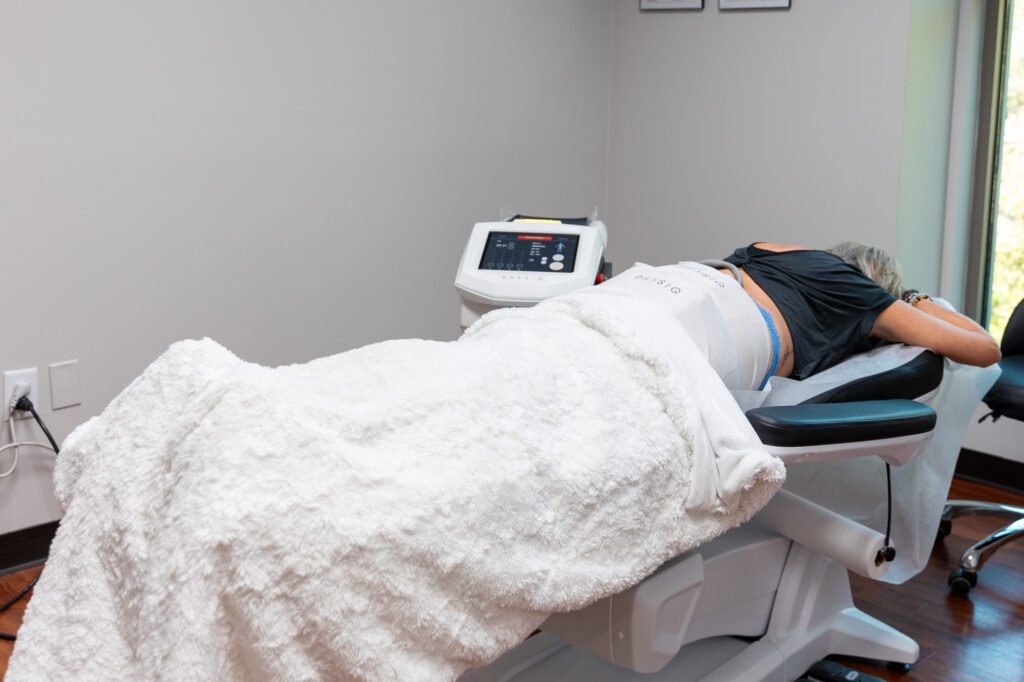
You may have heard a lot about testosterone and how fluctuating levels as men get older can impact health, but did you know about the effects of food on testosterone levels? At Regain Functional Medicine + Aesthetics, we offer testosterone replacement therapy (TRT) to help men struggling with diminished natural hormone levels. Learn more about testosterone, how it impacts your health, and how your diet can affect it.
Testosterone: Understanding the Male Sex Hormone
Testosterone is the major sex hormone in males. Although ovaries also produce testosterone, it is at a much lower rate than what testicles produce.
Testosterone is the main androgen, stimulating the development of male characteristics. Its levels spike during puberty and then begin to decrease when men enter their 30s, affecting sex drive, the way men store fat, red blood cell production, sperm production, and muscle mass.
When testosterone levels get too low, you can begin experiencing negative symptoms, including:
- Weight gain
- Decreased sex drive
- Thinner bones
- Less body hair
- Mood swings
- Depression
- Less energy
Although testosterone levels will naturally decrease as a man ages, some things can cause an even greater dip in levels. Cancer treatments, like chemotherapy or radiation, can decrease testosterone, as can AIDS, alcoholism, kidney disease, and many other conditions. One thing most men do not know, however, is that testosterone and diet have a very close connection.
Diet Effects on Testosterone: Foods That Can Lower Testosterone Levels
When it comes to testosterone and diet, can the latter really affect the former? Absolutely. For example, men who follow a diet high in refined carbohydrates and saturated fats tend to have lower testosterone levels than those who stick to less inflammatory foods.
Not only do foods high in refined carbohydrates and saturated fats lower testosterone levels, they can lead to weight gain, which further lowers testosterone levels. If you’re concerned with the effects of food on testosterone levels, it can help to know some foods that can negatively impact your natural hormone levels, potentially making a naturally-decreasing testosterone level worse.
Soy Products
Foods made of soy, like edamame and tofu, can cause a drop in your testosterone levels. Soy contains phytoestrogens, which are compounds physically similar to estrogen, and they function in a similar manner. Although you would have to eat a lot of soy products to see a significant decline, men who already have lower testosterone levels should avoid soy.
Baked Goods
Completely avoiding baked goods is not necessary, but decreasing the number of them you have can be important if you are worried about testosterone levels. Baked goods tend to be high in trans-unsaturated fatty acids, which are the kinds of fatty acids associated with low testosterone levels. Sweet treats can also increase your insulin levels, and higher insulin also decreases testosterone.
Vegetable Oils
To improve their shelf life and their taste, producers of vegetable oils hydrogenate them. They contain polyunsaturated fats, the frequent consumption of which can lead to lowered testosterone levels. Vegetable oils also contain omega-6 fatty acids. Too much omega-6 can not only lead to lower levels of testosterone but can also reduce testicular size.
Licorice Root
Licorice root is a common ingredient in teas and beverage sweeteners, and it is also available as an herbal supplement. Eating 7 grams a day of licorice root can lower your testosterone levels because it inhibits the enzymes that help produce the hormone.
Alcohol
Having a drink now and then is not a problem, but if you habitually consume many drinks, you can be seriously impacting your hormone levels. Drinking too much alcohol can impede the normal working of your pituitary gland, hypothalamus, and testes.
If your hypothalamus can’t release the gonadotropin-releasing hormone, your pituitary gland can’t release the luteinizing hormone or the follicle-stimulating hormone — and without these, your testes can’t synthesize testosterone.
What to Do About Low Testosterone Levels
If you’re concerned about diet’s effects on testosterone or if you have noticed some of the symptoms of low testosterone, one of the best options is to turn to testosterone replacement therapy (TRT). Testosterone treatment aims to re-balance hormone levels so that you can start feeling more like yourself again.
There are injectable testosterone treatments, which involve getting a shot every week or every other week, or long-acting TRT, which spreads out injections over a number of weeks. Topical testosterone is also available in the form of gels and creams. Although you have to apply these every day to get the results you want, blood testosterone levels can be very stable with topical solutions.
For men who want to get help for testosterone issues but don’t want to worry about gels or regular injections, there are also pellets. These pellets go under your skin and release testosterone at regular intervals.
Beginning Your TRT
If you think you can benefit from TRT, schedule a consultation with us. We will ask you about your medical history, lifestyle, diet, and much more. We will also need to perform a blood test to see what your testosterone levels are so that we can put together the treatment that can offer exactly what you need. With just a few exams, Regain Functional Medicine + Aesthetics in Kansas City, KS, can get you on your way to balancing your testosterone levels.
Turn to Experts in Kansas City, KS
If you find yourself battling low libido, a lack of energy, depression, or any of the other symptoms of low testosterone, we can help. Contact us at Regain Functional Medicine + Aesthetics, and we can guide you in finding TRT options you can rely on.

